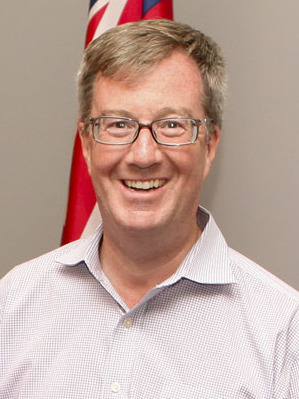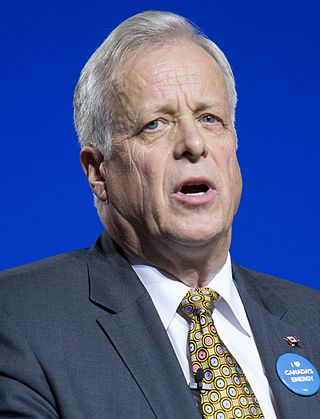Related Research Articles

The Canadian Broadcasting Corporation, branded as CBC/Radio-Canada, is the Canadian public broadcaster for both radio and television. It is a Crown corporation that serves as the national public broadcaster, with its English-language and French-language service units commonly known as CBC and Radio-Canada, respectively.

Paul Edgar Philippe Martin, also known as Paul Martin Jr., is a Canadian lawyer and politician who served as the 21st prime minister of Canada and the leader of the Liberal Party of Canada from 2003 to 2006.
The Conservative Party of Canada, colloquially known as the Tories, is a federal political party in Canada. It was formed in 2003 by the merger of the two main right-leaning parties, the Progressive Conservative Party and the Canadian Alliance, the latter being the successor of the Western Canadian–based Reform Party. The party sits at the centre-right to the right of the Canadian political spectrum, with their federal rival, the Liberal Party of Canada, positioned to their left. The Conservatives are defined as a "big tent" party, practising "brokerage politics" and welcoming a broad variety of members, including "Red Tories" and "Blue Tories".

The Saskatchewan Party is a conservative political party in the Canadian province of Saskatchewan. The party was founded in 1997 by a coalition of former provincial Progressive Conservative and Liberal Party members who sought to unite opposition to the governing New Democratic Party. Since 2007, the Saskatchewan Party has been the province's governing party, and both the party and the province are currently led by Premier Scott Moe.

James Alexander Watson is a Canadian politician who served as the 56th mayor of Ottawa from 2010 to 2022. Previously, he served as an Ottawa city councillor from 1991 to 1997, and as mayor from 1997 to 2000.

Jay D. Hill is a Canadian politician who served as the Conservative Member of Parliament (MP) for the riding of Prince George—Peace River in British Columbia from 1993 to 2010. He served as Government House Leader in the House of Commons during his tenure (2008–2010). On July 21, 2010, Hill announced that he would be retiring at the May 2011 federal election. In October 2010, he announced he would retire on October 25, 2010. He recently served as the interim leader of the Maverick Party from 2020 to 2022.

Anything But Conservative was a strategic voting campaign trialled by opponents of the Conservative Party of Canada. It was also known as the ABC campaign, or Vote ABC.

Scott Moe is a Canadian politician serving as the 15th and current premier of Saskatchewan since February 2, 2018. He is a member of the Legislative Assembly of Saskatchewan for the riding of Rosthern-Shellbrook, first elected in 2011. He served in the Saskatchewan Party cabinet from 2014 to 2017 under the premiership of Brad Wall, twice as minister of environment and also as minister of advanced education. In January 2018 he was chosen to succeed Wall as leader of the Saskatchewan Party. He led the party to a fourth consecutive majority mandate in the 2020 provincial election.
The Canadian federal budget for fiscal year 2012–13 was presented to the House of Commons of Canada by Finance Minister Jim Flaherty on 29 March 2012. Among the most notable elements of the federal budget were changes to Old Age Security and a reduction of the budget for the Canadian Forces and the Canadian Broadcasting Corporation.
The Canadian federal budget for fiscal year 2013–2014 was presented to the House of Commons of Canada by Finance Minister Jim Flaherty on 21 March 2013. The budget bill was tabled in the legislature on 29 April 2013 as the Economic Action Plan 2013 Act, No. 1. A second budget bill will be tabled in the autumn, which will include elements excluded from the first bill, such as the Canada Job Grant. The deficit was projected to be $18.7 billion for the fiscal year 2013-2014, however this was adjusted to $8.1 billion by end of the fiscal year and once the Auditor General's recommendations on the Government's unfunded pension obligations were taken into account.

William Francis Morneau Jr. is a Canadian businessman and former Liberal Party politician who served as minister of finance and member of Parliament (MP) for Toronto Centre from 2015 to 2020.

The 2021 Canadian federal election was held on September 20, 2021, to elect members of the House of Commons to the 44th Canadian Parliament. The writs of election were issued by Governor General Mary Simon on August 15, 2021, when Prime Minister Justin Trudeau requested the dissolution of parliament for a snap election.
The Canadian federal budget for the fiscal years of 2020–21 and 2021–22 was presented to the House of Commons by finance minister Chrystia Freeland on 19 April 2021. The Canadian government did not produce a budget in 2020 due to the COVID-19 pandemic. Instead, the government produced a series of economic updates and stimulus plans throughout the year.
The Canadian federal budget’for fiscal year 1994-1995 was presented by Minister of Finance Paul Martin in the House of Commons of Canada on 22 February 1994. It was the first federal budget under the premiership of Jean Chrétien.
The Canadian federal budget for fiscal year 1981-1982 was presented by Minister of Finance Allan MacEachen in the House of Commons of Canada on 12 November 1981.
The Canadian federal budget for fiscal year 1977-1978 was presented by Minister of Finance Donald Stovel Macdonald in the House of Commons of Canada on 31 March 1977. The budget introduced wage and price controls in an attempt to control inflation. This policy had been a campaign proposal put forward by Robert Stanfield's Progressive Conservatives it the 1974 Canadian federal election, but was criticized by Pierre Trudeau at the time.
The Canadian federal budget for fiscal year 1975-1976 was presented by Minister of Finance John Turner in the House of Commons of Canada on 23 June 1975.
The Canadian federal budget for fiscal year 1973-1974 was presented by Minister of Finance John Turner in the House of Commons of Canada on 19 February 1973.
The 1972 Canadian federal budget for fiscal year 1972-1973 was presented by Minister of Finance [John N. Turner] in the House of Commons of Canada on 8 May 1972. It was the last budget before the 1972 Canadian federal election, and included tax cuts for corporations, and aid for the elderly and post-secondary students.

The 44th Canadian Parliament is the session of the Parliament of Canada which began on 22 November 2021, with the membership of the House of Commons, having been determined by the results of the 2021 federal election held on 20 September. Parliament officially resumed on 22 November with the re-election of Speaker Anthony Rota, and the Speech from the Throne read by Governor General Mary Simon the following day.
References
- 1 2 3 "Canada's deficits and surpluses, 1963-2014". CBC News. CBC/Radio-Canada. Retrieved April 25, 2015.
- ↑ "Budget Tells Tale Tonight". news.google.com. The Regina Leader-Post. October 23, 1968. Archived from the original on 2020-06-23. Retrieved June 17, 2020.